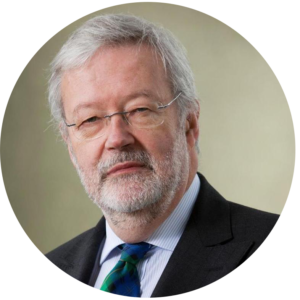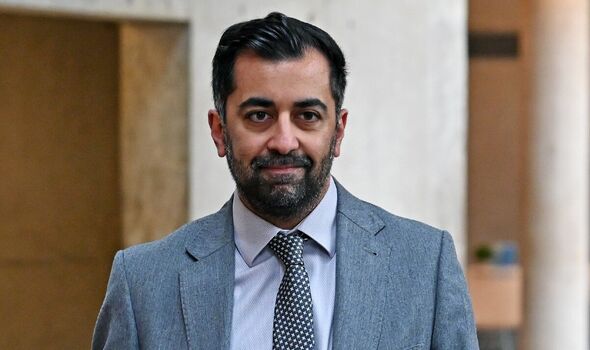
Jim Gallagher
Professor Jim Gallagher is Chair of Our Scottish Future
For the last decade it’s been: when’s the next referendum? In the next few years it might be: how can Scotland get more of what independence claimed to offer?
Amidst the rattle of pots, pans, and campervans which is today’s SNP, it’s easy to lose sight of the big picture. That’s not their struggle to get their books audited, nor even the criminal investigation of the very centre of Scotland’s largest political party, though goodness knows where that will lead.
The real question is what this point of inflexion means for the country. Whom will it elect, and, at a more profound level, what is the Scottish Question becoming?
As for elections, the other political parties have suddenly got hopeful. Rural areas lost to the SNP 30 years ago are once again in Tory sights. With an independence referendum a distant dream, Sturgeon’s nominated successor, purportedly socially progressive and economically left of centre, might be vulnerable there. But voters who supported the SNP because of Scottish identity may not move to the Conservatives, who have survived only by becoming the British unionist party.
Labour too is looking again at places it was once able to take for granted. Its weakness over the last decade – it was not seen clearly enough on one side or the other of the binary identity argument – is suddenly a strength. Middle Scotland SNP voters in the urban west could well be comfortable with a party which promotes autonomy, but not separation. The published polls so far suggest opinion has not moved enough to give Labour the crop of Westminster seats it would like, but SNP support may yet have further to fall, and the tipping point is not far away. Labour’s first opportunity likely comes this autumn in Rutherglen.
Humza Yousaf’s party meantime is coming apart at the organisational seams. Long suppressed personal and organisational rivalries are increasingly evident. Such divisions could be fixed with time, leadership and vision, were Yousaf to have each of them. More strategic is the difference between socially conservative nationalists who hope to retain much of rural Scotland, and those like Yousaf who present a progressive face to keep the urban votes taken from Labour. Without the insistent drum beat of a referendum just round the corner he will be vulnerable to challenge from Kate Forbes’ wing of the party. Poor electoral results, even in a byelection, could make the continuity candidate a transitional figure.

So significant electoral changes might be in prospect. A good showing next autumn in Scotland could cement Keir Starmer in office, with a significant impact on the constitutional question. No Labour government could be as toxic in Scotland as recent Tory ones, and Labour is likely to introduce reforms already announced to strengthen and protect devolution, not undermine it. Further ahead, the 2016 Holyrood vote could easily remove the pro-independence majority there, but it is far too early to forecast.
Electoral changes, however, may be signs of a deeper shift. The old joke goes that whenever Gladstone got close to answering the Irish question, the Irish secretly changed the question. That might be happening in Scotland today.
Over recent decades, the SNP’s success has been to politicise identity. The third or so of the population who see themselves as purely Scottish have tended to vote SNP and support independence, unlike the third who see themselves as mainly British. The folk in the middle, who feel both Scottish and British, can be tempted by either independence or union. After over two years of the 2014 referendum campaign, nationalism’s achievement was to persuade nearly half of them to support separation, and then vote SNP too.
We’ve been there ever since, as the campaign never really ended. Nationalists, buoyed up by getting 45%, by increasingly unpopular Tory governments and the chaos of Brexit, have been demanding another referendum ever since. But they’ve got nowhere, and there won’t be one: opinion hasn’t shifted. Sturgeon’s retirement allows the nationalist movement to admit the campaign is at last over, and they have still lost.
Cue much understandable distress, but some straight talking too. SNP president Mike Russell, dismayed by scandal, made two candid admissions. First, independence was a long way off. A statement of the obvious perhaps, and Yousaf too has now said as much, but it changes the content of Scottish political debate significantly. Russell also admitted the SNP had failed to figure out how to disentangle a complex modern state. Pro-UK campaigners, warning about the risks of separation for decades, may well feel vindicated. But this recognition of objective constraints on the independence dream hints where the Scottish question might go next.
Voters are ahead of the parties. SNP support has started to fall. No longer driven by referendum demands, voters may be focussing on the SNP’s weak domestic record as well as its scandals. Nevertheless, 45% still say they’d vote for independence if asked. But they don’t want to be forced to choose anytime soon, and if you dig deeper they don’t actually seem to want independence in the old SNP sense of a separate sovereign state, disentangled from the UK. In polling they assert their Scottish identity, but most actually say they’d rather stay inside significant UK institutions, like shared health provision and old age pensions, currency, national security and, for many, defence.
For a decade the Scottish question has been – when’s the next referendum? For the next decade, with independence a far-off possibility, it may be different, more like – how can Scotland now get more of what independence claimed to offer? The prize in Scottish politics goes to whatever party can offer a working answer to that more sensible question. More important, answering it to the satisfaction of enough Scots would move us on to the economic and social problems badly neglected in years of constitutional debate, and start fixing that dismal domestic record.
Enjoyed this article? Register for our summer rally and be part of delivering a poverty free future!










